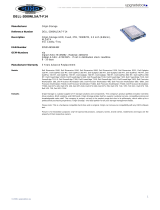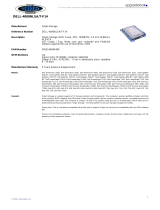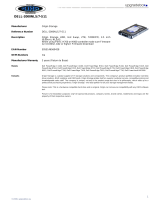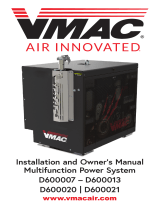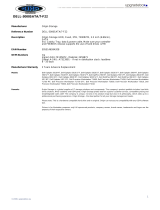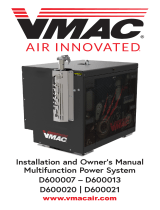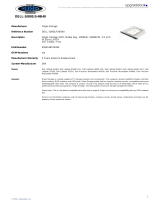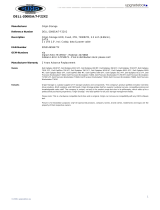Page is loading ...

Dell EMC OpenManage Essentials Version 2.3
Support Matrix

Notes, cautions, and warnings
NOTE: A NOTE indicates important information that helps you make better use of your product.
CAUTION: A CAUTION indicates either potential damage to hardware or loss of data and tells you how to avoid the
problem.
WARNING: A WARNING indicates a potential for property damage, personal injury, or death.
Copyright © 2017 Dell Inc. or its subsidiaries. All rights reserved. Dell, EMC, and other trademarks are trademarks of Dell Inc. or its
subsidiaries. Other trademarks may be trademarks of their respective owners.
2017 - 09
Rev. A01

Introduction
Dell EMC OpenManage Essentials is a hardware management application that provides a comprehensive view of the Dell systems,
devices, and components in your environment. This document lists the agents, devices, operating systems, and databases supported
by OpenManage Essentials version 2.3.
NOTE: For the list of devices supported by Dell EMC SupportAssist Enterprise, see the
Dell EMC SupportAssist
Enterprise Support Matrix
at dell.com/serviceabilitytools.
Supported agents
NOTE: For more information on the devices listed in this document, see the documentation for that device.
Table 1. Agents supported by OpenManage Essentials
Dell systems agents Supported version
Dell EMC OpenManage Server Administrator
For 14th generation of PowerEdge servers — 9.0.1
For 11th, 12th and 13th generation of PowerEdge servers — 8.4
or later
Dell EMC Lifecycle Controller
For 14th generation of PowerEdge servers — 3.00.00.00
For 12th and 13th generation of PowerEdge servers —
2.30.30.30 or later
For 11th generation of PowerEdge servers — 1.6.x or later
Chassis Management Controller (CMC)
For PowerEdge M1000e — 5.1 or later
For PowerEdge VRTX — 2.1 or later
For PowerEdge FX2 and FX2s — 1.3 or later
iDRAC9 3.00.00.00
iDRAC7 and iDRAC8 2.30.30.30 or later
NOTE: Make sure that Express or Enterprise licenses are
available to perform rmware updates.
iDRAC6
For monolithic systems — 1.98 or later
For modular systems — 3.65 or later
Dell Command Monitor (previously Dell OpenManage Client
Instrumentation)
9.1 or later
Dell Networking OS
9.10.0.0, 9.10.0.1P10, 9.11.0.0 and 9.11.2.0
Supported devices
Supported Dell EMC PowerEdge servers
NOTE: In the PowerEdge server name format yxxx; y denotes alphabets, for example M,R, or T, and x denotes numbers.
Table 2. Supported PowerEdge servers
yx0x systems yx1x systems yx2x systems yx3x systems yx4x systems
PowerEdge M600 PowerEdge R210 PowerEdge M420 PowerEdge M630 PowerEdge M640
PowerEdge M605 PowerEdge R210 II PowerEdge M520 PowerEdge M830 PowerEdge R440
3

yx0x systems yx1x systems yx2x systems yx3x systems yx4x systems
PowerEdge M805 PowerEdge R310 PowerEdge M620 PowerEdge T130 PowerEdge R540
PowerEdge M905 PowerEdge R510 PowerEdge M820 PowerEdge T330 PowerEdge R640
PowerEdge R200 PowerEdge R515 PowerEdge R220 PowerEdge T430 PowerEdge R740
PowerEdge R300 PowerEdge R610 PowerEdge R320 PowerEdge T630 PowerEdge R740xd
PowerEdge R805 PowerEdge R710 PowerEdge R420 PowerEdge R230 PowerEdge R940
PowerEdge R900 PowerEdge R810 PowerEdge R520 PowerEdge R330 PowerEdge T440
PowerEdge R905 PowerEdge R815 PowerEdge R620 PowerEdge R430 PowerEdge T640
PowerEdge T100 PowerEdge R910 PowerEdge R720 PowerEdge R530 PowerEdge FC640
PowerEdge T105 PowerEdge R410 PowerEdge R720xd PowerEdge R530xd
PowerEdge T300 PowerEdge R415 PowerEdge R820 PowerEdge R630
PowerEdge T605 PowerEdge R715 PowerEdge R920 PowerEdge R730
PowerEdge T110 PowerEdge T320 PowerEdge R730xd
PowerEdge T110 II PowerEdge T420 PowerEdge R830
PowerEdge T310 PowerEdge T620 PowerEdge R930
PowerEdge T410 PowerEdge FC420 PowerEdge FC430
PowerEdge T610 PowerEdge FC620 PowerEdge FC630
PowerEdge T710 PowerEdge FM120x4 PowerEdge FC830
PowerEdge M610
PowerEdge M610x
PowerEdge M710
PowerEdge M710HD
PowerEdge M910
Table 3. PowerEdge C Series servers
C Series
PowerEdge C6220 PowerEdge C6100 PowerEdge C4130
PowerEdge C8220 PowerEdge C5220 PowerEdge C6320
PowerEdge C6320p PowerEdge C6420
NOTE: Among the PowerEdge C Series servers, OpenManage Essentials supports the server conguration management
feature only on PowerEdge C4130, C6320, C6320p, and C6420.
Supported Dell EMC VxRail Hyper-converged appliances
Table 4. Supported VxRail Hyper-converged appliances
VxRail E460 VxRail E460F VxRail P470 VxRail P470F
VxRail V470 VxRail V470F VxRail S470
4

Supported Dell EMC XC Series Web-Scale converged appliances
Table 5. Supported XC Series Web-Scale converged appliances
XC6320-6 XC6320-6AF XC430 Xpress XC430-4
XC430-8 XC630-10 XC630-10AF XC630-10P
XC730-16G XC730xd-12 XC730xd-12C XC730xd-12R
XC730xd-12R Xpress XC730xd-12S XC730xd-24 XC730xd-24S
Supported Dell storage module
PowerEdge FD332
Supported Dell chassis devices
Table 6. Supported chassis devices
Dell PowerEdge VRTX Dell PowerEdge M1000e Dell PowerEdge FX2 Dell PowerEdge FX2s
Supported Dell EqualLogic devices
Table 7. Supported EqualLogic devices
EqualLogic PS4000E EqualLogic PS5500E EqualLogic PS6110S EqualLogic PS6510X
EqualLogic PS4000X EqualLogic PS6000E EqualLogic PS6110X EqualLogic PS6610E
EqualLogic PS4000XV EqualLogic PS6000X EqualLogic PS6110XS EqualLogic PS6610X
EqualLogic PS4100X EqualLogic PS6000XV EqualLogic PS6110XV EqualLogic PS6610ES
EqualLogic PS4100XV EqualLogic PS6010 EqualLogic PS6210E EqualLogic PS-M4110
EqualLogic PS4100E EqualLogic PS6010E EqualLogic PS6210X EqualLogic PS-M4110X
EqualLogic PS4110X EqualLogic PS6010X EqualLogic PS6210XV EqualLogic PS-M4110XV
EqualLogic PS4110XV EqualLogic PS6010XV EqualLogic PS6210S EqualLogic PS-M4110E
EqualLogic PS4110E EqualLogic PS6010XVS EqualLogic PS6210XS EqualLogic PS-M4110XS
EqualLogic PS4210E EqualLogic PS6100 EqualLogic PS6500
EqualLogic PS4210X EqualLogic PS6100E EqualLogic PS6500E NAS appliances
EqualLogic PS4210XV EqualLogic PS6100S EqualLogic PS6500ES EqualLogic FS7500
EqualLogic PS4210XS EqualLogic PS6100X EqualLogic PS6500X EqualLogic FS7600
EqualLogic PS5000E EqualLogic PS6100XV EqualLogic PS6510 EqualLogic FS7610
EqualLogic PS5000X EqualLogic PS6100XS EqualLogic PS6510E
EqualLogic PS5000XV EqualLogic PS6110E EqualLogic PS6510 ES
NOTE: Only EqualLogic NAS appliances with Fluid File System (Fluid FS) version 3 are supported.
5

Supported Dell PowerVault devices
Table 8. Supported PowerVault devices
PowerVault NX200 PowerVault MD3200 PowerVault MD3620i Tape Libraries/Drives
PowerVault NX300 PowerVault MD3200i PowerVault MD3620f PowerVault TL2000
PowerVault NX3000 PowerVault MD3220 PowerVault MD3660i PowerVault TL4000
PowerVault NX3100 PowerVault MD3220i PowerVault MD3660f PowerVault ML6000
PowerVault NX3230 PowerVault MD3260 PowerVault MD3800i
PowerVault NX3330 PowerVault MD3260i PowerVault MD3800f
PowerVault NX3500 PowerVault MD3400 PowerVault MD3820f
PowerVault NF500 PowerVault MD3420 PowerVault MD3820i
PowerVault DP500 PowerVault MD3460 PowerVault MD3860f
PowerVault DL2000 PowerVault MD3600i PowerVault MD3860i
PowerVault DL2100 PowerVault MD3600f
PowerVault DL2200
PowerVault MD3060e
Supported Dell EMC devices
Table 9. Supported devices
Dell EMC CX300 CX4 Series - Flare / Navisphere CX4 Series - Flare / Unisphere
Dell EMC CX3-10 Dell EMC CX4-120 Dell EMC CX4-120
Dell EMC CX3-20 Dell EMC CX4-240 Dell EMC CX4-2400
Dell EMC CX3-40 Dell EMC CX4-480 Dell EMC CX4-480
Dell EMC CX3-80 Dell EMC CX4-960 Dell EMC CX4-960
Dell EMC CX500
Dell EMC CX700
Supported Dell EMC Storage devices (previously Dell Compellent devices)
Table 10. Supported Storage devices
Compellent SC4020 NAS appliance
Complellent SC7020 Compellent FS8600 version 3
Compellent SC8000
Compellent SC9000
Storage SCv2000
6

Supported Dell Disk Backup devices
Table 11. Supported Disk Backup devices
Dell DR4300 Dell DR4300e Dell DR6300
Supported Dell Networking devices (previously PowerConnect and Force10 devices)
Table 12. Supported Networking devices
PowerConnect 2808 PowerConnect 6224F PowerConnect B-8000
PowerConnect 2816 PowerConnect 6248 PowerConnect B-8000e
PowerConnect 2824 PowerConnect 6248P PowerConnect B-MLXe 16
PowerConnect 2848 PowerConnect 7000 PowerConnect J-SRX210
PowerConnect 3424 PowerConnect 7024 PowerConnect J-SRX240
PowerConnect 3424P PowerConnect 7024F PowerConnect J-EX4200 (48T)
PowerConnect 3448 PowerConnect 7024P PowerConnect J-EX8216
PowerConnect 3448P PowerConnect 7048 PowerConnect M6220
PowerConnect 3548 PowerConnect 7048F PowerConnect M6348
PowerConnect 3548P PowerConnect 7048P PowerConnect M8024
PowerConnect 3524 PowerConnect 8024 PowerConnect M8024K
PowerConnect 3860 PowerConnect 8024F PowerConnect M8428K
PowerConnect 5224P PowerConnect 8100 PowerConnect W-3200
PowerConnect 5316M PowerConnect 8132 PowerConnect W-3600
PowerConnect 5324 PowerConnect 8132F PowerConnect W-6000 M3
PowerConnect 5424 PowerConnect 8164 PowerConnect W-650
PowerConnect 5448 PowerConnect 8164F PowerConnect W-7210
PowerConnect 5524 PowerConnect B-DCX-4S PowerConnect W-7220
PowerConnect 5548 PowerConnect B-RX 4 PowerConnect W-7240
PowerConnect 6224 PowerConnect B-RX 8
PowerConnect 6224P PowerConnect B-RX 16
Force10 C150 Force10 S50 Force10 S4820T
Force10 C300 Force10 S55 Force10 S5000
Force10 E1200i Force10 S60 Force10 S6000
Force10 E300 Force10 S3048 Force10 Z9000
Force10 E600i Force10 S4048 Force10 MXL 10/40GbE
Force10 E610 Force10 S4810
Force10 S25P Force10 S4820P
Dell Networking C7004 Dell Networking N3048P Dell Networking W7205
Dell Networking C7008 Dell Networking N4000 Dell Networking X1008
7

Dell Networking C9010 Dell Networking N4032 Dell Networking X1008P
Dell Networking N2024 Dell Networking N4032F Dell Networking X1018
Dell Networking N2024P Dell Networking N4064 Dell Networking X1018P
Dell Networking N2048 Dell Networking N4064F Dell Networking X1026
Dell Networking N2048P Dell Networking M3020 Dell Networking X1026P
Dell Networking N3024 Dell Networking M3048 Dell Networking X1052
Dell Networking N3024P Dell Networking S6010-ON Dell Networking X1052P
Dell Networking N3024F Dell Networking S6100-ON Dell Networking X4012
Dell Networking N3048 Dell Networking S4048T-ON Dell Networking Z9500
PowerEdge M I/O Aggregator PowerEdge FN2210S PowerEdge FN410S
PowerEdge FN410T
Supported network security appliances
Table 13. Supported network security appliances
Dell SonicWALL NSA 250M
Supported Brocade devices
Table 14. Supported Brocade devices
Brocade 200E Brocade 5100 Brocade 6505 Brocade M6505
Brocade 300 Brocade 5300 Brocade 6510 Brocade 8000
Brocade 4424 Brocade M5424 Brocade 6520 Brocade 8424-K
Supported managed rack Power Distribution Units
Table 15. Supported managed rack Power Distribution Units
K538N G756N H544N J523N K539N
Supported metered rack Power Distribution Units
Table 16. Supported metered rack Power Distribution Units
1X98J XX5T6 C0G4D G740N G744N
7P35N RXKCH G728N H534N H537N
09FG8 K5YYY J519N J520N J521N
4J1C2 2CM2K K535N K536N 6809
Supported Keyboard, Video, and Mouse (KVM)
Table 17. Supported Keyboard, Video, and Mouse (KVM)
1081AD 2161AD 2161DS-2 2321DS 4332DS
1082DS 2161DS 2162DS 4161DS
8

Supported Dell UPS
Table 18. Supported Dell UPS
1000T HV 500T HV 2700R/T LV 2700R Telco HV 5600R LI HV-US
4200R HV 1000R LV 2700R/T HV 3750R HV-US 5600R LI HV
1920T LV 1000R HV 2700R/T HV-US 3750R HV 5600R OL HV-US
1920T HV 1920R LV 2700R Telco LV 4200R HV-US 5600R OL HV
500T LV 1920R HV 2700R Telco HV-US 4200R HV
Supported Dell printers
Table 19. Supported Dell printers
Dell W5300 Dell 5130cdn Dell 2335dn Dell 1710n Dell B1165nfw
Dell S2500 Dell 5110cn Dell 2330dn Dell 1600n Dell C1660w
Dell M5200 Dell 5100cn Dell 2155c(d)n Dell 1320c Dell C1760nw
Dell 5535dn Dell 3335dn Dell 2150cdn Dell B2360d/dn Dell C1765nf/nfw
Dell 5530dn Dell 3130cn Dell 2145cn Dell B3460dn Dell B1265dfw
Dell 5330dn Dell 3115cn Dell 2135cn Dell B3465dn/dnf
Dell 5310n Dell 3110cn Dell 2130cn Dell B5460dn
Dell 5230dn Dell 2355dn Dell 1815dn Dell B5465dnf
Dell 5210n Dell 2350dn Dell 1720n Dell B1163/w
Supported client systems
Table 20. Supported client systems
Latitude 13 Latitude E6400 Precision R5400 Precision T7810 OptiPlex 9030
Latitude 10 ST2 Latitude E6410 Precision R7610 OptiPlex 980 OptiPlex XE
Latitude D531 Latitude E6540 Precision R7910 OptiPlex 990 OptiPlex XE2
Latitude 14 Rugged
Extreme 7407
Latitude E6430U Precision R7920 OptiPlex 3011 OptiPlex 7010
Latitude 3550 Latitude E7240 Precision T1700 OptiPlex 3020M Dell Venue 11 Pro
7130/7139
Latitude E3440 Latitude E7440 Precision T3600 OptiPlex 3030
Latitude E3540 Latitude E7450 Precision T3610 OptiPlex 9010AIO
Latitude E5450 Latitude Z600 Precision T5610 OptiPlex 9020
Latitude E6220 Precision M4700 Precision T7610 OptiPlex 9020AIO
NOTE: If an alert is received from a device with unknown severity, you can import the device MIB les using the MIB
Import Utility to enable OpenManage Essentials to classify the alerts.
9

OEM devices
Dell OEM devices (re-branded or de-branded Dell servers and Compellent S8000 iDRAC), when discovered, are classied under
OEM Devices in the device tree. Most of the functionality available to Dell servers, such as tasks, reports, and lters are also
applicable to Dell OEM servers. However, system update may not be possible if it is not supported by the OEM device module. OEM
servers are always classied under the OEM Devices group in the device tree. They are not displayed under the Servers or RAC
group. If both the server and RAC of the OEM device are discovered, they are correlated and displayed as one device under the
OEM Devices group. Other OEM devices except servers and RAC are classied under the dierent server groups such as Microsoft
Virtualization Servers, VMware ESX servers, and so on, based on the classication criteria they satisfy.
Supported operating systems
This section lists the operating systems on which you can install OpenManage Essentials (on a management station) and the
operating systems that OpenManage Essentials can manage (for managed systems).
Supported operating systems for management stations
• Microsoft Windows Server 2016 Standard and Datacenter Editions
• Windows Server 2012 R2 Standard and Datacenter Editions
• Windows Server 2012 Standard and Datacenter Editions
• Windows Server 2008 R2 SP1 Standard and Enterprise Editions
NOTE: OpenManage Essentials version is supported only on 64-bit operating systems.
NOTE: The Wow64 component is required to run on a 64-bit operating system.
NOTE: OpenManage Essentials is also supported on virtual machines.
NOTE: Ensure that KB2919355 update is installed on Windows 2012 R2 systems to run OpenManage Essentials 2.3. To
install KB2919355 update manually, see the Microsoft Knowledge Base article ID 2919355 at support.microsoft.com.
Supported operating systems for managed systems
The Dell systems and operating system versions that OpenManage Essentials can manage correspond to the Dell systems and
operating systems supported by Dell OpenManage Software. For the Dell systems and operating system versions that OpenManage
Essentials can manage, see the Dell systems and operating systems listed in the Dell Systems Management - OpenManage
Software Support Matrix. To access the support matrix, visit dell.com/openmanagemanuals. On the Support page, click
OpenManage Software, and then click the appropriate version of OpenManage software.
NOTE: The operating systems supported by OpenManage Software vary depending on the OpenManage Software
version.
Supported operating systems for managed client systems
The Dell systems and operating system versions that OpenManage Essentials can manage correspond to the Dell systems and
operating systems supported by Dell Command Monitor. For the Dell systems and operating system versions that OpenManage
Essentials can manage, see the Dell systems and operating systems listed in the Dell Command | Monitor User's Guide. To access
the User’s Guide, visit dell.com/support. On the Support page, click View Products → Software & Security → Dell Client
Command Suite → Dell Command | Monitor, and then click the appropriate version of Dell Command Monitor.
NOTE: The operating systems supported by Dell Command Monitor vary depending on the Dell Command Monitor
version.
10

Supported databases
NOTE: Only case-insensitive instance of SQL Server is supported. SQL Server 2012 SP1 Express is installed with
OpenManage Essentials version 2.3.
• Microsoft SQL Server 2016 Standard, Enterprise, and Express Editions
• SQL Server 2014 Standard, Enterprise, and Express Editions
• SQL Server 2012 Standard, Enterprise, and Express Editions
• SQL Server 2008 R2 SP1 Standard, Enterprise, and Express Editions
NOTE: Both 32-bit and 64-bit versions of SQL Server are supported. However, it is recommended to use a 64-bit version
of SQL Server.
Supported browsers
• Microsoft Internet Explorer 10 and 11
• Mozilla FireFox 50 and 51
NOTE: Supported only on Windows-based operating systems.
Minimum Recommended Hardware for OpenManage Essentials
Table 21. Minimum Recommended Hardware
Minimum
Recommended
Hardware
Large deployments Large deployments Large deployments Medium
deployments [a]
Small deployments
[a]
Number of
Devices
Up to 8000 Up to 5500 Up to 2000 Up to 500 Up to 100
Type of
System
Physical machines /
Virtual machines
Physical machines /
Virtual machines
Physical machines /
Virtual machines
Physical
machines / Virtual
machines
Physical
machines / Virtual
machines
RAM 16 GB 8 GB 8 GB 6 GB 6 GB
Processor
cores
16 8 8 4 2
Database
SQL Enterprise or
Standard
SQL Enterprise or
Standard
SQL Enterprise or
Standard
SQL Express SQL Express
Database
Location
Remote [b] Remote [b] Remote [b] Local Local
Free space on
hard drive
30 GB 20 GB 10 GB 10 GB 10 GB
[a] If you are not using SQL Express, limit the maximum memory to 2 GB less than the total system memory and disable SQL analysis
and report services.
[b] Install the remote database on a system that supports the minimum recommended hardware for OpenManage Essentials.
NOTE: The recommended minimum hardware requirements for OpenManage Essentials on a domain controller are 8 GB
RAM, 8 cores processor, and a remote database.
NOTE: If Dell SupportAssist is installed along with OpenManage Essentials, you require 2 GB RAM and 2 cores in addition
to the minimum requirements described in the previous table. If you are using SQL Server Standard or Enterprise
Editions, the maximum SQL Server memory must be congured within SQL Server to prevent it from using the entire
system memory. It is recommended that you use a maximum of 4 GB for a 6 GB RAM.
11

• Microsoft .NET Framework version 4.6.2
• SQL database, for more information, see Supported databases.
• Operating system, for more information, see Supported operating systems.
• Supported browsers, for more information, see Supported browsers.
• Microsoft Silverlight version 5.1.50901
• Microsoft Visual C++ 2015 Runtime 14.0
• Network Bandwidth—1 Gbps or higher
NOTE: The recommended minimum network bandwidth required for OpenManage Essentials in a WAN environment is 10
Mbps (for monitoring) and 20 Mbps (for updates).
Support for Stateless Deployment
Stateless deployments depend on the Host Bus Adapter (HBA) cards available in the PowerEdge servers. A server may have HBA
cards manufactured by one or more vendors. Stateless deployments may or may not be supported on a server depending on the
HBA card vendor.
NOTE: For the list of HBA card types that support stateless deployment, see “Supported cards for I/O Identity
Optimization” in the
iDRAC User’s Guide
at Dell.com/idracmanuals.
NOTE: Before you perform stateless deployment, ensure that the HBA cards have the latest rmware version installed.
Known Limitations for Stateless Deployment
The following are the known limitations for deploying virtual I/O identities on target servers:
• On Broadcom network adapters, OpenManage Essentials does not support boot from ISO for installing the operating system on
a SAN along with the virtual I/O identity deployment. However, if an operating system is already installed on the SAN, after
deployment of virtual I/O identities, the server can boot from the SAN.
• For PowerEdge FC430, FC630, and FC830 sleds, the PCIe cards (FC and iSCSI) in the shared PCIe slots of the PowerEdge
FX2s chassis are supported for stateless deployment. However, if the PCIe cards are mapped, replacement can be performed
only to an exactly similar sled in the same slot with the same PCIe mapping in another chassis. If the PCIe cards are not mapped,
replacement can be performed on any similar sled.
• For performing stateless deployment on blade servers, the FlexAddress mode must be disabled on the blade server to prevent
the host chassis from assigning I/O identity attributes. Even if the FlexAddress mode is enabled, OpenManage Essentials
overrides the FlexAddress mode.
• While performing a stateless deployment on a server with a QLogic Converged Network Adapter, OpenManage Essentials
generates dierent attribute values for the virtual MAC (vMAC) and virtual FIP (vFIP) MAC attributes. However, only the value
of the vMAC attribute is deployed for both the vMAC and vFIP MAC attributes. If you create a zone for SAN boot before the
deployment, ensure that the zone is created based on the vMAC address generating virtual WWPN (vWWPN) and virtual
WWNN (vWWNN). For example, 20:00:vMAC for vWWNN and 20:01:vMAC for vWWPN.
• Intel NIC cards do not support unique iSCSI initiator name for each port. OpenManage Essentials deploys the same IQN value for
all ports in the Intel NIC card.
Contacting Dell
NOTE: If you do not have an active Internet connection, you can nd contact information on your purchase invoice,
packing slip, bill, or Dell product catalog.
Dell provides several online and telephone-based support and service options. Availability varies by country and product, and some
services may not be available in your area. To contact Dell for sales, technical support, or customer service issues:
1. Go to Dell.com/support.
2. Select your support category.
3. Verify your country or region in the Choose a Country/Region drop-down list at the bottom of the page.
4. Select the appropriate service or support link based on your need.
12
/
